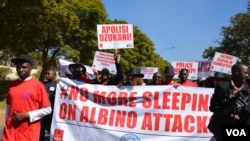Malawi's Supreme Court has banned the death penalty, ruling it unconstitutional because it negates the right to life. Some Malawians hail the ruling, while others denounced the decision as removing a major deterrent to serious crime.
The landmark ruling Wednesday came after an appeal from a convicted murderer.
In its judgment, the court said Malawi's constitution respects the right to life and said the death penalty negates that right. The court emphasized the sanctity of life, saying without right to life, other rights do not exist.
The court also ordered the re-sentencing of all cases where the death penalty was handed down. Court records show that 27 people are under a death sentence in Malawi.
Michael Kaiyatsa, executive director for the Centre for Human Rights and Rehabilitation in Malawi, welcomes the ruling.
"For us, an effective punishment is life imprisonment, not death penalty," he said. "There is also no evidence anywhere in the world that death sentence has contributed to reduction in murder or killings."
But critics such as social commentator Humphrey Mvula say the court's decision may lead to acts of mob justice.
"Because those that would be aggrieved at that particular time, the spontaneous action will be, 'Even if we catch this person who has killed this person, he is not going to die.' So individuals would rather see that person die on the spot, realizing that if he goes to court, the best judgment court can administer would be basically life sentence," Mvula said.
The president of Malawi's Association of People with Albinism has similar concerns.
Ian Simbota says without the death penalty, the government will not be able to deter attacks on albinos, and people will start punishing perpetrators on their own.
"And the reason is not going to be the judgment. The reason is going to be government systems' failure to respond to security concerns of persons with albinism," Simbota said. "If the government is failing to be proactive on these issues, people will find a way because we people with albinism are not safe (in Malawi)."
The death penalty has long been mandatory in Malawi for those convicted of murder or treason, and optional for rape.
However, according to Amnesty International, Malawi last carried out an execution in 1992 when 12 people were hanged.




